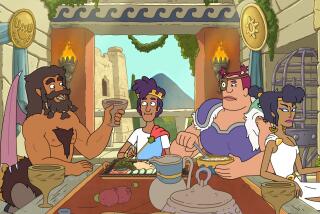Olympian organizers
- Share via
Early in the 5th century BC, the politician and genealogist Hekataios of Miletos visited Egypt. The country’s hoary antiquity and taste for the colossal both impressed and irritated him, as it did the many Greeks, from intellectuals to mercenaries, who noted its wonders. (They duly cut it down to size: The Greek words for pyramid, obelisk, crocodile and ostrich were adapted from native terms meaning, respectively, a honey-and-sesame bun, a shish-kebab skewer, a house lizard and a sparrow.) When Hekataios got to Thebes, he felt he had to keep his end up with the priests and informed them proudly that not only could he trace his family back for 16 generations but there also was a god at the head of the tree. The priests, unfazed, countered with 341 documented generations and the scornful comment that no mortal ever had a divine ancestor.
What makes this story of special interest is the fact that Hekataios was famous, even notorious, in his day for a supposedly rationalist approach to myth. “The tales of the Greeks,” he pronounced in the preface to “Genealogies,” his lost work on origins, “are, in my opinion, not only multiple, but ridiculous.” This from a man who not only claimed descent from a god but also told, straight-faced, a story about the discovery of wine in which a pregnant bitch gave birth to a rooted vine stock. About 300 years later, in the sophisticated mid-3rd century BC, nothing had changed. We find a chronological table recorded on stone, the so-called Parian Marble that without question assimilates myth to history, sliding effortlessly from a contest (dated to 1531 BC) between Poseidon and Ares for possession of the future Areopagus, by way of the Amazons’ attack on Athens (1256 BC) and the campaign of the Seven Against Thebes five years later, to such undisputed historical landmarks as the Battle of Marathon (490 BC) or the death of Alexander the Great (323 BC).
This apparent credulity regarding legends of origin should give comfort to the begetters of what are being touted as two new and exhaustive (though by their very nature not definitive) genealogical tables. Both embrace the entirety of Greek myth, drawn from sources ranging well over a millennium in time. Harold and Jon O. Newman list no less than 3,673 characters, plus alternative relationships, in a minutely detailed index in “A Genealogical Chart of Greek Mythology.” Vanessa James’ double-sided stemma, “The Genealogy of Greek Mythology,” pulls out concertina-like to a staggering 17 feet (My wife and I checked this.) and lists more than 3,000 characters. In both works the layout and typography are of quite stunning complexity and elegance. The ingenuity, research, decision-making and interminable grind at intractable (and often incompatible) testimony that have gone into these truly Herculean labors almost defy comprehension. This is a serious business. But why?
What made the Greco-Roman intelligentsia (and others) agonize over such questions as the identity of Hecuba’s mother? (Telecleia, Eunoe or Metope, according to the Newmans; James has only Metope, though Eunoe is elsewhere implied by a reference to her husband.) The obsession with answers assumes a basic historicity to myth, of ancestral origins lying not too far beyond a Bronze Age of heroes and gods on Earth. Myths explained these origins and offered authorization and empowerment through lines of descent. They also memorialized great deeds from the past (Herakles, the Argonauts) and, in a culture devoid of sacred scriptures, offered moral examples, wisdom, social precedent. We learn of the struggle for Thebes between Oedipus’ sons, of King Minos in Crete and above all of the Trojan War pitting Anatolians against Aegean Greeks.
What is curious about this quasi-historical background (when compared, as above, with that of Egypt) is its short perspective. The Greek mythical world is, in essence, that of the Mycenaean Age. Hekataios’ 16 generations are of average length and take us back to the Mycenaean Age. The earliest chronological strata of myth all seem to hit a blank wall somewhere in the 16th century BC: Before that we come very soon to Typhon, Ocean, Chaos, Erebus and black Night. The Parian Marble puts Deukalion’s flood in 1528. I have often wondered whether the mythological record may not, at some level, also reflect the effect of the eruption of Thera (modern Santorini) about this time. In 1883, Krakatoa blasted 9 square miles of rock into the stratosphere with an explosion audible 3,000 miles away and killed 36,000 people with the huge tsunamis that followed. Day became night; the sky rained pumice and ash. Thera’s blast hefted four times that amount of rock into the skies. We know that the entire palace civilization on Crete was temporarily wiped out. Chaos, Erebus, black Night and floods are precisely what we find reported from Krakatoa, and they would have been true a fortiori of Thera.
This (like so much else about Greek myth) is pure speculation, but it does make sense of the fact that Greeks felt themselves very much late arrivals in terms of ancestry when compared with an ancient culture such as that of Egypt -- and so needed, as in the case of Hekataios, to make competitive claims for themselves. They might not go back 300 generations, but the odds on a spot of classy divine blood in their pedigree was surprisingly high. James’ catalog, “Children of Gods,” is an eye-opener. Hephaistos and Dionysos are near the bottom with a mere 21 offspring each. Hermes scores 30, Ares 50 and Apollo 73. You might think old polyphiloprogenitive Zeus would top the list; but no, at 104 he’s far behind that horse-loving oceanic stud Poseidon, who has about 150. With myriad descendants of all those nymphs, nereids, milkmaids, flower-gathering princesses and other jeunes filles en fleur to pick from, doctoring your early pedigree can’t have been very hard.
Archaic religious traditions die hard, surviving to embarrass the urban middle classes. As early as the 6th century BC, intellectuals such as Xenophanes of Kolophon were already tut-tutting about the immorality of the gods (“thieves, adulterers, liars”) as reported by Homer and Hesiod. Euripides dramatized, deadpan, their mean, spiteful, arbitrary motivation: Try his prologue to “The Trojan Women,” in which Athena and Poseidon cheerfully plan cyclones and drownings to appease their wounded dignity. Rationalists allegorized them into philosophical abstractions. Christian apologists found them woefully lacking in comfort for the virtuous. All this left its mark on modern scholarship, with its core assumptions of secular humanism, and even more so on rehashers of ancient myth, from Bulfinch and Hawthorne to Calasso, whose have-a-nice-day versions simply left the gods’ nastier habits out of the loop altogether.
Enter now, fresh from politely correcting the more extravagant aberrations of Martin Bernal’s “Black Athena,” that excellent scholar Mary Lefkowitz, who in her new book, “Greek Gods, Human Lives,” is bent not just on restoring the gods to their proper central role in myth but also on reminding us, forcefully, of two crucial facts. First, that the moralizers, allegorizers et al. formed no more than a tiny percentage, at any time, of the Greek community, which took its polytheistic pantheon very seriously indeed; and second, that “the religion depicted in the myths ... describes the world as it is, not as we would like it to be.” The gods are indeed terrifying and arbitrary: Mortals tiptoe around them as if they were high-voltage cables. There is no meliorist pie-in-the-sky about the rewarding of virtue. Placating divinity is no more than a longshot insurance policy. Yet the myths also “place consistent emphasis on the value of individual lives and the importance of taking action against injustice,” she writes. There are no sacred scriptures. Prayer (to paraphrase a famous Hippocratic aphorism) is fine and dandy, but you need to use your own initiative as well.
Applying these criteria, Lefkowitz briskly retells a bunch of classic myths, not only from Homer, Hesiod and Greek tragedy, but also those to do with the voyage of the Argonauts and the adventures of Virgil’s Aeneas. The cold air of reality blowing through these pages is a tonic. The Greeks always knew that prosperity is transitory, that disasters strike from the blue, that we seldom live to see justice done and that nine times out of 10 the gods couldn’t care less. “Greek Gods, Human Lives” is, among other things, a salutary tract for these times. *


